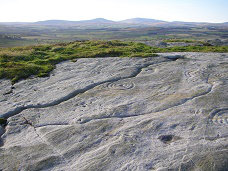British Rock Art
Stan Beckensall

I have been recording British rock art for over thirty years as a leisure-time activity. When I began it was
regarded by some as the equivalent of brass-rubbing.
No one tried seriously to research it or to fit it into the archaeological
record. In many ways it was easier to classify flints, pottery or hillforts: there was little kudos to be gained from such a vague
and unsatisfactory aspect of human culture as these marks on the rocks. All that has changed, we now have some of our bright
archaeologists and government departments involved. Universities have set up rock-art departments. Much of the impetus has come
from Europe and the rest of the world, but the early work that forms the basis of our present knowledge was carried out by
intelligent and cultured people who had lives outside professional archaeology, with enquiring minds and other disciplines,
the antiquarians of the last and the nineteenth century.
Now money is being directed into the recording of rock art, into studies of the threats to it, and into its preservation and display.
This comes as no surprise to continental archaeologists, who are already convinced of its importance. One example is in my main
study-area and home: Northumberland.
Stan Beckensall.
Download Article
British Rock Art by Stan Beckensall.
Stan Beckensall has kindly given permission for this article to be made available for those interested in rock art.
A pdf version is available for downloaded here

"This work is licensed under a Creative Commons Attribution-NonCommercial 4.0 International License





